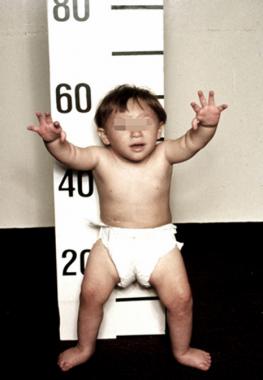Whipple's disease physical examination: Difference between revisions
Jump to navigation
Jump to search
No edit summary |
|||
| Line 4: | Line 4: | ||
==Overview== | ==Overview== | ||
Patients with | Patients with Whipple's disease usually appear weak. Physical examination of patients with Whipple's disease is usually remarkable for weight loss and joint pain. Further physical findings depend on the systems involved by the disease. | ||
==Physical Examination== | ==Physical Examination== | ||
*Physical examination of patients with | *Physical examination of patients with Whipple's disease is usually remarkable for generalised weakness secondary to weight loss and joint pain in peripheral joints. | ||
*The presence of | *The presence of eye findings namely Oculomasticatory, or oculofacialskeletal, myorhythmia are pathognomic. | ||
===Appearance of the Patient=== | ===Appearance of the Patient=== | ||
*Patients with Whipple's disease may appear weak and | *Patients with Whipple's disease may appear weak and tired some times severe enough to cause cachexia secondary to malabsorption and weight loss. | ||
===Vital Signs=== | ===Vital Signs=== | ||
| Line 50: | Line 37: | ||
===Lungs=== | ===Lungs=== | ||
* | *In patients who develop pleural effusion lungs are hyporesonant | ||
*There may be asymmetrical chest expansion. | |||
* | *Distant breath sounds | ||
*Reduced [[tactile fremitus]] | |||
* | |||
* | |||
===Heart=== | ===Heart=== | ||
| Line 66: | Line 47: | ||
===Abdomen=== | ===Abdomen=== | ||
*[[Abdominal distention|Abdominal bloating]] and cramps may be compained by some patients. <ref name="pmid11432814">{{cite journal| author=Dutly F, Altwegg M| title=Whipple's disease and "Tropheryma whippelii". | journal=Clin Microbiol Rev | year= 2001 | volume= 14 | issue= 3 | pages= 561-83 | pmid=11432814 | doi=10.1128/CMR.14.3.561-583.2001 | pmc=88990 | url=https://www.ncbi.nlm.nih.gov/entrez/eutils/elink.fcgi?dbfrom=pubmed&tool=sumsearch.org/cite&retmode=ref&cmd=prlinks&id=11432814 }} </ref> | *[[Abdominal distention|Abdominal bloating]] and cramps may be compained by some patients. <ref name="pmid11432814">{{cite journal| author=Dutly F, Altwegg M| title=Whipple's disease and "Tropheryma whippelii". | journal=Clin Microbiol Rev | year= 2001 | volume= 14 | issue= 3 | pages= 561-83 | pmid=11432814 | doi=10.1128/CMR.14.3.561-583.2001 | pmc=88990 | url=https://www.ncbi.nlm.nih.gov/entrez/eutils/elink.fcgi?dbfrom=pubmed&tool=sumsearch.org/cite&retmode=ref&cmd=prlinks&id=11432814 }} </ref> | ||
* | *[[hepatosplenomegaly]] may be seen in some patients | ||
===Neuromuscular=== | ===Neuromuscular=== | ||
| Line 76: | Line 57: | ||
===Extremities=== | ===Extremities=== | ||
* | *Arthralgia of peripheral joints can be frequently seen | ||
*Joint deformity with Whipple's disease is extremely rare | |||
* | |||
==References== | ==References== | ||
Revision as of 16:47, 27 October 2017
|
Whipple's disease Microchapters |
|
Diagnosis |
|---|
|
Treatment |
|
Case Studies |
|
Whipple's disease physical examination On the Web |
|
American Roentgen Ray Society Images of Whipple's disease physical examination |
|
Risk calculators and risk factors for Whipple's disease physical examination |
Editor-In-Chief: C. Michael Gibson, M.S., M.D. [1]; Associate Editor(s)-in-Chief: Bhagyashree Deshmankar M.B.B.S.[2]
Overview
Patients with Whipple's disease usually appear weak. Physical examination of patients with Whipple's disease is usually remarkable for weight loss and joint pain. Further physical findings depend on the systems involved by the disease.
Physical Examination
- Physical examination of patients with Whipple's disease is usually remarkable for generalised weakness secondary to weight loss and joint pain in peripheral joints.
- The presence of eye findings namely Oculomasticatory, or oculofacialskeletal, myorhythmia are pathognomic.
Appearance of the Patient
- Patients with Whipple's disease may appear weak and tired some times severe enough to cause cachexia secondary to malabsorption and weight loss.
Vital Signs
- Low-grade intermittent fever may be present in some patients. it might be associated with night sweats [1]
Skin
- Hyperpigmentation may be present in some patients. It is more frequent in sun exposed areas. [1]
- Some patients may develop skin nodules
-
Description (Adapted from Dermatology Atlas)
-
Description (Adapted from Dermatology Atlas)
HEENT
- Nystagmus
- Extra-ocular movements may be abnormal. Oculomasticatory, or oculofacialskeletal, myorhythmia are pathognomic. [1]
Neck
- Lymphadenopathy is common. Peripheral lymph nodes may be palpable. [1]
Lungs
- In patients who develop pleural effusion lungs are hyporesonant
- There may be asymmetrical chest expansion.
- Distant breath sounds
- Reduced tactile fremitus
Heart
- A systolic murmur may be heard in patients with cardiac valve involvement. [1]
Abdomen
- Abdominal bloating and cramps may be compained by some patients. [1]
- hepatosplenomegaly may be seen in some patients
Neuromuscular
- Patient may be asymptomatic or may have cognitive changes [1]
- Patient may have altered level of consciousness [1]
- Some patients may present with seizure[1]
- Myoclonus may be present
- Ataxia may be present [1]
Extremities
- Arthralgia of peripheral joints can be frequently seen
- Joint deformity with Whipple's disease is extremely rare
